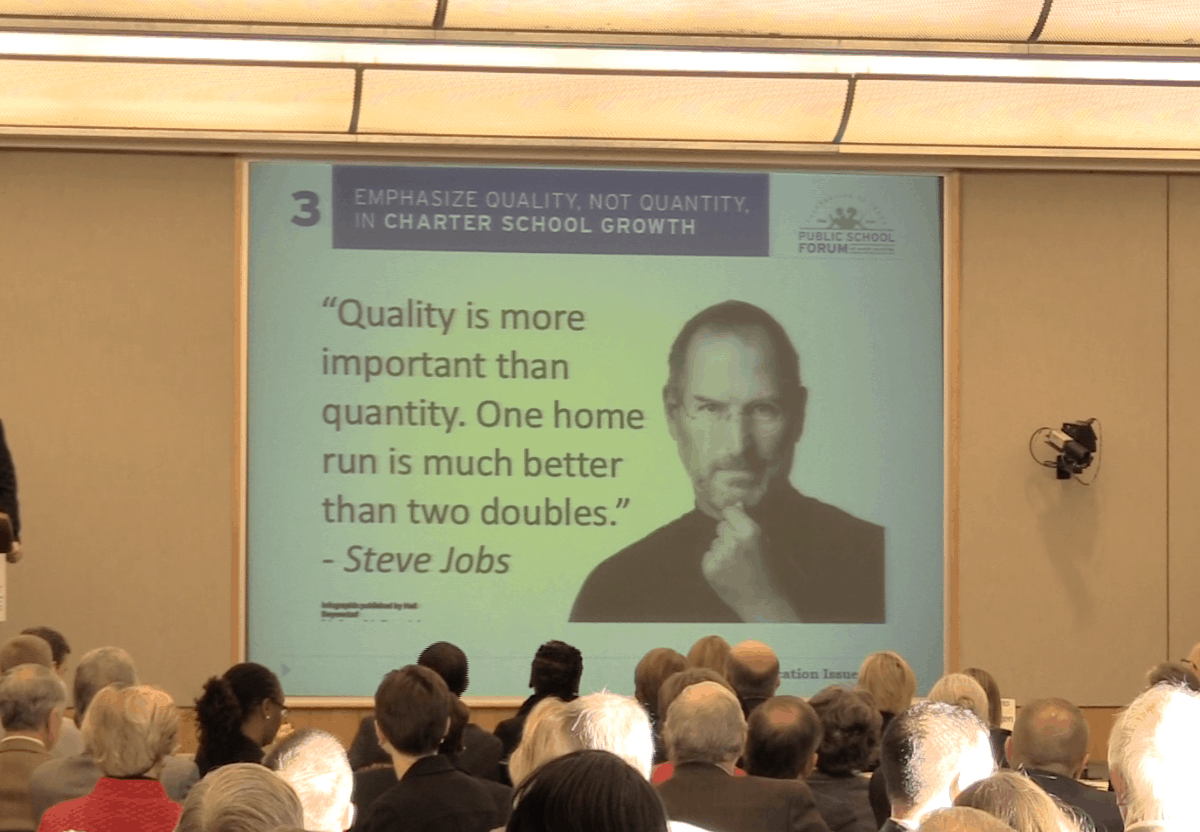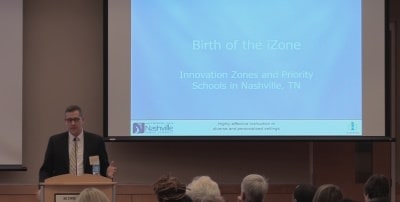

The Public School Forum of North Carolina staked out its position yesterday on a host of hot button education issues, including race, charters, and school performance grades.
The annual Eggs & Issues event held by the Forum serves as its public declaration of what it thinks will and should dominate the education debate in 2016. Yesterday, for only the second year, a crowd that included teachers, education officials, and legislators met at the Marbles Museum in downtown Raleigh to eat those eggs and hear those issues in the form of the Forum’s top-10 list.
As he presented the first issue on the Forum list, President Keith Poston challenged the notion that money is scarce for education.
“l would suggest to you that there are many myths that need busting, and one is that we can’t afford to do more.” Poston said. “We can. It’s a matter of priority.”
For the next 30 or so minutes, Poston and James Ford, Forum program director and former NC Teacher of the Year, went down the list, explaining why the issues on it are crucial to the education debate this year. Here is that list:
- Direct Adequate Resources to Public Schools, Teachers, and Leaders
- Transform the Profession to Make NC a Teaching Destination Again
- Emphasize Quality, not Quantity, in Charter School Growth
- Elevate Race as a Focal Point of Public Education
- Fix the Broken A-F Grading System
- Support the State’s Struggling Schools
- Maintain High Standards for North Carolina
- Make Evidence-Based Decisions on Expansion of Private-School Vouchers
- Expand Access to High-Quality Early Childhood Education
- Build Bridges for Students through Expanded Learning
A further breakdown of the issues and the priorities that shape them can be located here.
When it comes to the first issue — directing adequate resources to schools and educators — Poston said that public schools need to be a priority when North Carolina leaders create policies that could impact state revenue. And in addition to increased funding for educator recruitment and retention, he brought up the threat he said the “Taxpayer Bill of Rights” (TABOR) poses. He said the public should resist efforts to bring it to North Carolina. “We believe that enshrining a measure like that in our state’s constitution could tie our hands for decades,” Poston said. Here is a link to the bill.
Charter schools made the number three spot, with the Forum urging that charter school quality should be the state’s focus, not quantity.
“We are at a crossroads in our state with regards to charter schools,” Poston said.
Growth has increased since the charter school cap was lifted in 2011, with 58 new charters and two new virtual charters, Poston said. The cap kept the number of state charters at 100.
He also emphasized that he is not anti-charter, noting that his daughter went to a charter for middle school.
“There are many outstanding charter schools in North Carolina…we’d like to keep it that way,” he said.
Ensuring quality requires multiple strategies, including good accountability, research on who charters serve, and more equitable funding for charter schools, Poston said. He also cautioned the state on its two virtual charters. He pointed out the mixed record of a management company in charge of one of the schools.
K12 Inc runs North Carolina Virtual Academy. According to this Washington Post article, K12 has been criticized for subpar academic performance. The article says that K12-run virtual schools in Colorado and Pennsylvania ended their relationships with the company, and a statewide virtual school in Tennessee run by K12 was ordered to close at the end 2014-15 before a judge intervened and said it could have one more year.
Making race a focus in public education made number four on the Forum list. Ford said the race of students can affect what schools they attend, what courses they take, and how they’re disciplined.
“It is an unfortunate and incontrovertible fact that race still matters,” Ford said.
And, he added, racial bias isn’t always obvious.
“The subtle nature of racial inequality is that it can often show up even when we’re not looking for it,” he said.
To get below the surface, Ford said the state needs to delve into education data to see if students of color are being impacted disproportionately. Other strategies listed in a handout from the Forum include: creating schools that are integrated both racially and socioeconomically, hiring and keeping more teachers of color, and making sure that vouchers only go to disadvantaged students who aren’t getting what they need in a traditional public school.
The Public School Forum also wants to fix the school performance grades, placing it at number five on its list. The school performance grades give schools a letter grade based on their academic achievement (which makes up 80 percent of the grade) and growth. Poston said growth needs to make up more of the school grade percentage. He also said that the letter grades should be used by the state to find schools that need help and then give it to them.
“This letter grade system needs to be fixed or it needs to be scrapped,” Poston said.
Helping low-performing schools is number six on the Forum’s list. Ford said the first step to doing so is changing the definition so that the school performance grades no longer play a role in the low-performing designation.
The General Assembly changed the definition for the designation of “low-performing school” during this past session, leading to a 58.3 percent increase in the number of such schools in 2014-15 over the prior year. The new definition tied the designation to the school’s grade.
“The greatest indicator of how a school does is more demographic,” Ford said. “These are things that have nothing to do with the teaching quality taking place in the classroom and everything to do with the experience and the backgrounds that students come from.”
Those are just some of the many issues covered during the presentation. You can watch it and hear about the rest of the Forum’s top 10 issues in the video below.
Here is Poston’s recent News & Observer op-ed: “The myth of limited resources to support NC education.”
Editor’s Note: James Ford is on the EdNC Board of Directors.


